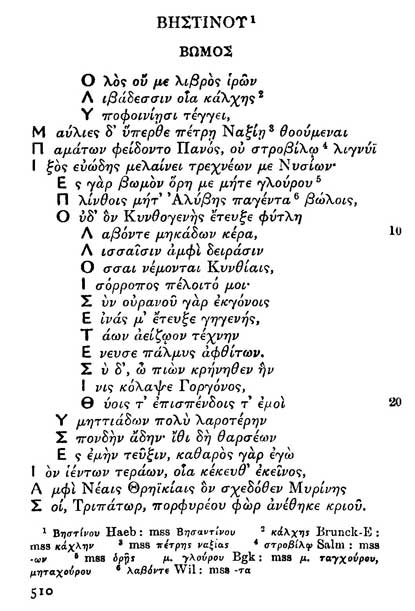PATTERN POEMS
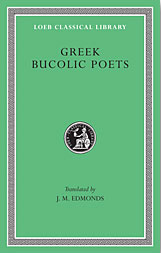
THE PATTERN POEMS are ancient Greek poems composed in the "bucolic" tradition with verses designed to form a specific shape--such as a pipe, an egg, wings, altar, etc.--and with complimentary theme. The few surviving examples of the genre date mainly from the Hellenistic era (C3rd to 2nd B.C.) and are preserved in a section of the Greek Anthology texts.
As the structure of these poems is lost in translation, I have included illustrations of the Greek text to illustrate the form. Several of the works are mythological riddles along the lines of Lycophron's Alexandra.
The Greek Bucolic Poets. Translated by Edmonds, J M. Loeb Classical Library Volume 28. Cambridge, MA. Harvard Univserity Press. 1912.
This Loeb volume is still in print and available new from Amazon.com (click on image right for details). In addition to this small collection of pattern-poems the book contains the Idylls of Theocritus, the poems of Bion and Moschus, source Greek texts, Edmond's introduction and footnotes and an index of proper names.
PATTERN POEMS CONTENTS
1. Simias I. The Axe
2. Simias II. The Wings
3. Simias III. The Egg
4. Theocritus, The Pipe
5. Dosiadas, The First Altar
6. Vestinus, The Second Altar
THE PATTERN POEMS, TRANSLATED BY J. M. EDMONDS
SIMIAS I. THE AXE
This poem was probably written to be inscribed upon a votive copy of the ancient axe with which tradition said Epeius made the Wooden Horse and which was preserved in the temple of Athena. The lines are to be read according to the numbering. The metre is choriambic, and each pair of equal lines contains one foot less than the preceding. The unusual arrangement of lines is probably mystic. Simias of Rhodes flourished about 300 B.C. (Anthology, XV, 22.)
Epeius of Phocis has given unto the man-goddess Athena, in requital of her doughty counsel, the axe with which he once overthrew the upstanding height of god-builded walls, in the day when with a fire-breath’d Doom he made ashes of the holy city of the Dardanids and thrust gold-broidered lords from their high seats, for all hew was not numbered of the vanguard of the Achaeans, but drew off an obscure runnel from a clear shining fount. Aye, for all that, he is gone up now upon the road Homer made, thanks be unto thee, Pallas the pure, Pallas the wise. Thrice fortunate he on whom thou hast looked with very favour. This way happiness doth ever blow.
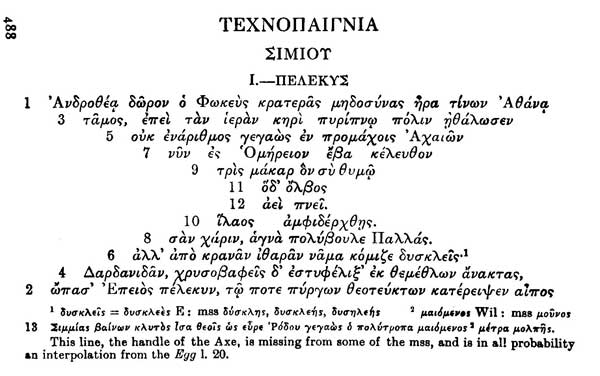
SIMIAS II. THE WINGS
This poem seems to have been inscribed on the wings of a statue – perhaps a votive statue – representing Love as a bearded child. The metre is the same as that of the Axe with the difference that the lines are to be read in the usual order. The poem also differs from the Axe in making no reference, except by its shape, to the wings of Love. Moreover it contains no hint of dedication. (Anthology XV, 24.)
Behold the ruler of the deep-bosomed Earth, the turner upside-down of the Son of Acmon,1 and have no fear that so little a person should have so plentiful a crop of beard to his chin. For I was born when Necessity bare rule, and all creatures, moved they in Air or in Chaos, were kept though her dismal governance far apart. Swift-flying son of Cypris and war-lord Ares – I am not that at all; for by no force came I into rule, but by gentle-willed persuasion, and yet all alike, Earth, deep Sea, and brazen Heaven, bowed to my behest, and I took to myself their old sceptre and made me a judge among gods.
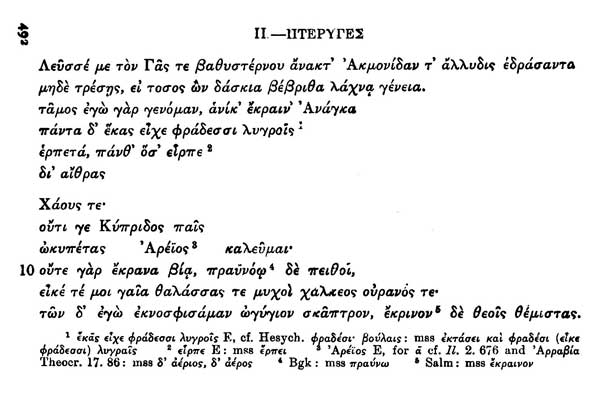
SIMIAS III. THE EGG
This piece would appear to have been actually inscribed upon an egg, and was probably
composed merely as a tour-de-force. If so, it forms a link in the development of such pieces between
the two preceding poems and Theocritus’ Pipe. The lines, like those of the Axe, are to
be read as they are numbered, and as there is no evidence here of dedication, the unusual order must have a
different purpose; the poem must be of the nature of a puzzle or riddle. The piece is marked out from the
Axe and the Wings on the one side, and from the Pipe on the other, by the variety of
its metrical scheme. The lines gradually increase from a trochaic monometer catalectic to a complicated decamter
of spondees, anapaests, paeons, and dactyls.
The “Dorian nightingale” is the poet and the “new weft” the poem itself. (Anthology, XV,
27.)
Lo here a new weft of a twittering mother, a Dorian nightingale; receive it with a right good will, for pure was the mother whose shrilly throes did labour for it. The loud-voicèd herald of the gods took it up from beneath its dear mother’s wings, and cast it among the tribes of men and bade it increase its number onward more and more – that number keeping the while due order of rhythms – from a one-footed measure even unto a full ten measures: and quickly he made fat from above the swiftly-slanting slope of its vagrant feet, striking, as he went on, a motley strain indeed but a right concordant cry of the Pierians, and making exchange of limbs with the nimble fawns the swift children of the foot-stirring stag. – Now these fawns through immortal desire of their dear dam do rush apace after the belovèd teat, all passing with far-hasting feet over the hilltops in the track of that friendly nurse, and with a bleat they go by the mountain pastures of the thousand feeding sheep and the caves of the slender-ankled Nymphs, till all at once some cruel-hearted beast, receiving their echoing cry in the dense fold of his den, leaps speedily forth of the bed of his rocky lair with intent to catch one of the wandering progeny of that dappled mother, and then swiftly following the sound of their cry straightway darteth through the shaggy dell of the snow-clad hills. – Of feet as swift as their urged that renownèd god the labour, as he sped the manifold measures of the song.
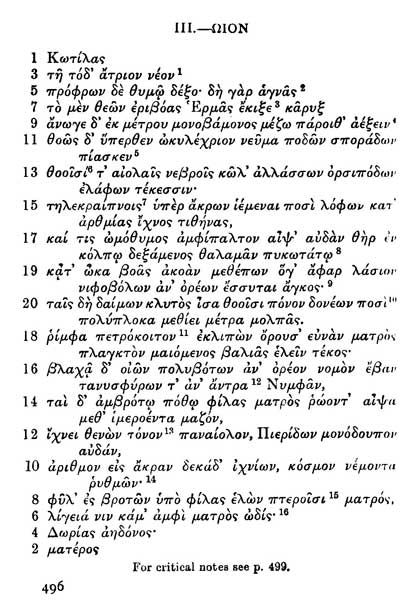
THEOCRITUS, THE SHEPHERD’S PIPE
The lines of this puzzle-poem are arranged in pairs, each pair being a syllable shorter than the preceding, and the dactylic metre descending from a hexameter to a catalectic dimeter. The solution of it is a shepherd’s pipe dedicated to Pan by Theocritus. The piece is so full of puns as to preclude accurate translation. The epithet Merops, as applied to Echo, is explained as sentence-curtailing, because she gives only the last syllables (?), but there is also a play on Merops “Thessalian.” The strongest reason for doubting the self-contained ascription of this remarkable tour-de-force to Theocritus is that the shepherd’s pipe of Theocritus’ time would seem to have been rectangular, the tubes being of equal apparent length, and the difference of tone secured by wax fillings. But to the riddle-maker and his public a poem was primarily something heard, not something seen, and the variation in the heard length of the lines would correspond naturally enough to the variation in note of the tubes of the pipe. Moreover, every musical person must have know that, effectively, the tubes were unequal. The doubling of the lines is to be explained as a mere evolutionary survival. The application of puzzles or riddles to this form of composition was new, but in giving himself the patronymic Simichidas the author is probably acknowledging his dept to his predecessor, Simichus being a pet-name for of Simias, as Amyntichus for Amyntas in VII. If so, the Pipe is anterior to the Harvest Home, and we have here the origin of the poet’s nickname. (Anthology, XV, 21.)
The bedfere1 of nobody2 and mother of the war-abiding3 brought forth a nimble director4 of the nurse of the vice-stone, not the hornèd one5 who was once fed by the son of a bull,6 but him whose heart was fired of old by the P-lessine7 of bucklers, dish8 by name and double9 by nature, whim that loved the wind-swift voice-born maiden10 of mortal speech,11 him that fashioned a sore12 that shrilled with the violet-crowned Muse into a monument of the fiery furnace of his love,13 him that extinguished the manhood14 which was of equal sound with a grandsire-slayer15 and drove it out of a maid16 of Tyre, him, in short, to whom is set up by this Paris17 that is son18 of Simichus this delectable piece19 of unpeaceful goods dear to the wearers of the blindman’s skin,20 with which heartily well pleased, thou clay-treading21 gadfly22 of the Lydian quean,23 at once thief-begotten24 and none-begotted, whose pegs25 be legs, whose legs be pegs, play sweetly I pray thee unto a maiden26 who is mute indeed and yet is another Calliopè27 that is heard but not seen.
1. Penelope.
2. Odysseus.
3. Telemachus.
4. Pan, hersman of (goats) the goat that suckled one (Zeus) for whom a stone was
substituted
5. Cerastas, long-horned = Comatas, long-haired.
6. bees, cf. 7.80 and Vergil Georgics 4.550.
7. Pitys (Pine) = P + itys; itys = shield-rim; ine (old spelling) = eyes, i.e.
bosses.
8. lit. whose; pan = all.
9. goat-legged.
10. Echo.
11. lit. voice-dividing (of Man).
12. Syrinx also = fistula.
13. for Syrinx.
14. the Persian at Marathon.
15. Perseus.
16. Europa (Euroep) was daughter of a Phoenician.
17. Theo-critus = judge between gods.
18. nickname of Theocritus.
19. woe = possession, ref. to the sore above.
20. i.e moleskin wallet, lit. wearers of the blind; blind = wallet.
21. lit. man-treading; Prometheus made man of clay.
22. beloved.
23. Omphalè (cf. Ovid, Fasti 2.805).
24. son of Hermes, and, in a sense, son of Odysseus.
25. lit. box-legged box = hoof.
26. Echo cannot speak of herself.
27. = of beautiful voice.
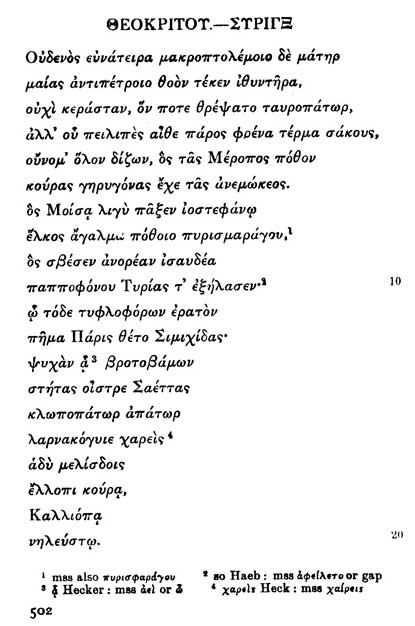
DOSIDAS, THE FIRST ALTAR
This puzzle is written in the Iambic metre and composed of two pairs of complete lines, five pairs of half-lines, and two pairs of three-quarter lines, arranged in the form of an altar. Of the writer nothing is known; he was obviously acquainted with the Pipe and also with Lycophron’s Alexandra. The poem is mentioned by Lucian (Lexiph. 25), but metrical considerations point to its being of considerably later date than the Pipe. Moreover, the idea of making an altar of verses presupposes a change in the conception of what a poem is. It was now a thing of ink and paper, and Dosiadas seems to have interpreted the Pipe in the light of the pipes of his own time, as representing the outward appearance of an actual pipe. (Anthology, XV, 26.)
I am the work of the husband1 of a mannish-mantled quean,2 of a twice-young mortal,3 not Empusa’s4 cinder-bedded scion,5 who was the killing6 of a Teucrian neatherd7 and of the childing of a bitch,8 but he leman9 of a golden woman; and he made me when the husband-boiler10 smote down the brazen-leggèd breeze11 wrought of the twice-wed mother-hurtled virgin-born12; and when the slaughterman13 of Theocritus14 and burner15 of the three-nighted16 gazed upon this wrought piece,17 a full dolorous shriek he shright, for a belly-creeping18 shedder of age did him despite with enshafted venom19; but when he was alackadaying in the wave-ywashen,20 Pan’s mother’s21 thievish twy-lived bedfellow22 came with the scion23 of a cannibal, and carried him into the thrice-sacked daughter24 of Teucer for the sake of Ilus-shivering25 arrow-heads.
1. Jason.
2. Medea put on man’s clothes to fly into Media.
3. rejuvenated in Medea’s caldron; this also = Thessalian.
4. i.e. Thetis, who could change her form like Empusa.
5. Thetis put Achilles in the fire to immortalize him.
6. active and passive.
7. he was killed by Paris.
8. and killer of Hector son of Hecuba, who became a dog.
9. i.e. Jason, who built this altar to Chrysè (= Golden) on the way to
Colchis.
10. Medea.
11. Talos the brazen man protected Crete; also = guardian and other things.
12. Hephaestus wedded Aphrodite and Aglaia, and was a virgin-birth of Hera who cast him from
Olympus.
13. Philoctetes.
14. Paris, see the Pipe.
15. lighter of the pyre.
16. Heracles was bettone on three nights.
17. the Altar.
18. a serpent.
19. poison = arrow.
20. isle of Lemnos.
21. Penelopè.
22. Odysseus carried off the Palladium and came alive from Hades.
23. Diomed, son of Tydeus who ate Melanippus’ head.
24. by Heracles, the Amazon, the Greeks; also = land of Troy.
25. the arrows of Heracles brought by Philoctetes caused (Troy’s fall and) the
destruction of the tomb (and corpse) of Ilus.
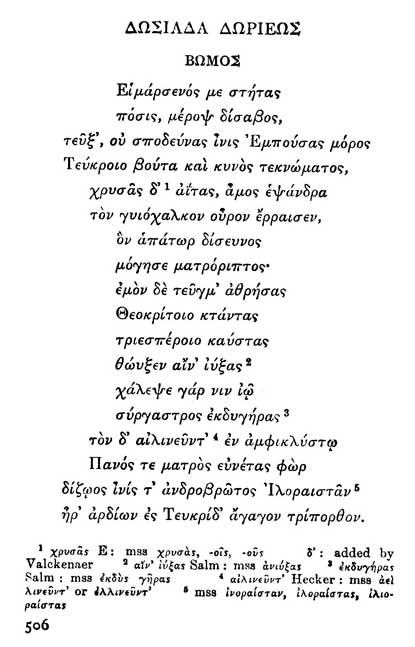
VESTINUS, THE SECOND ALTAR
The Bestantinus of the manuscripts is very probably a corruption of Bestinus, that is L. Julius Vestinus, who is described in an inscription as “High-priest of Alexandria and all Egypt, Curator of the Museum, Keeper of the Libraries of both Greek and Roman at Rome, Supervisor of the Education of Hadrian, and Secretary to the same Emperor.” The dedication to Hadrian is contained in the acrostic, which runs, “O Olympian, mayst thou sacrifice in many years.” The Altar is composed of three Anacreontean lines, three trochaic tetrameters, three phalaecians, eleven iambic dimeters, three anapaestic dimeters, and three choriambic tetrameters. The poem is not a puzzle, except in so far as the acrostic furnishes this element; for, unlike its predecessors, it refers to itself in definite terms. The author has confined his imitation of Dosiadas to the shape of the poem and the use of out-of-the-way words and expressions. (Anthology, XV, 25.)
The murky flux of sacrifice bedews me not with ruddy trickles like the flux of a purple-fish, the whittles whetted upon Naxian stone spare over my head the possessions1 of Pan, and the fragrant ooze of Nysian boughs2 blackens me not with his twirling reek; for in me behold an altar knit neither of bricks aureate nor of nuggets Alybaean3, nor yet that altar which the generation of two that was born upon Cynthus did build with the horns of such as bleat and browse over the smooth Cynthian ridges, be not that made my equal in the weighing, for I was builded with aid of certain offspring4 of Heaven by the Nine5 that were born of Earth, and the liege-lord of the deathless decreed their work should be eterne. And now, good drinker of the spring that was strucken of the scion of the Gorgon, I pray that thou mayst do sacrifice upon me and pour plentiful libation of far goodlier gust than the daughters of Hymettus; up and come boldly unto this wrought piece, for ‘tis pure from venom-venting prodigies such as were hid in that other, which the thief who stole a purple ram set up unto the daughter6 of three sires in Thracian Neae over against Myrinè.7
1. "possessions of Pan" : sheep and oxen.
2. "fragrant ooze of Nysian boughs" : frankincense.
3. "nuggets Albyaean" : explained by Iliad 2.857.
4. "offspring of Heaven" : the Graces.
5. "the Nine" : the Muses.
6. "daughter of three sires" : an etymological variation of Tritogeneia.
7. The last few lines refer to the Altar of Dosiadas, Myrinè being another name
for Lesbos.
